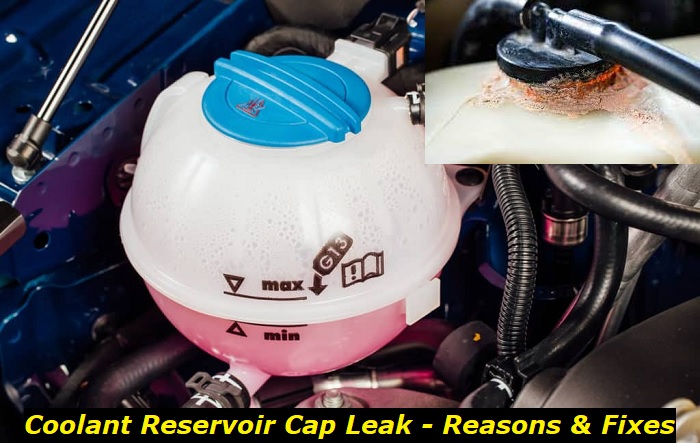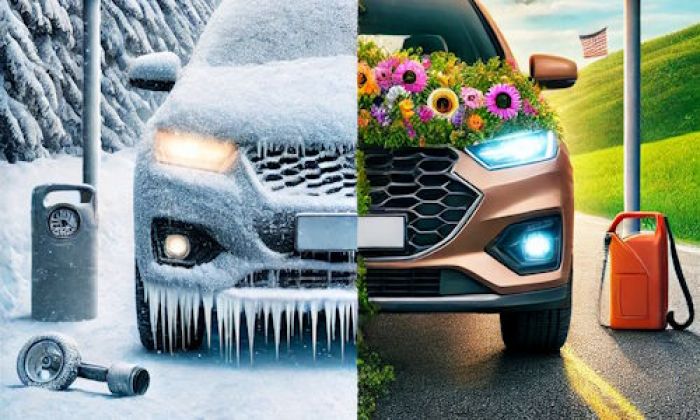Unassuming in size and appearance, the reservoir cap serves a major role in keeping your car's engine working safely. So if you notice that your coolant reservoir cap starts leaking, don't ignore it. Instead, identify the reason for it and immediately look for a solution.
Coolant leaks highlights
- Level of urgency:very high
- Commonreasons:cooling equipment failure, pipe connections, radiator damage
- DIY diagnostics:possible but complicated
- DIY repair:mostly impossible
- Price of repair:$350 - $1,500
- Time for repair:3 - 8 hours
- If ignored:overheating, equipment failure

Reasons For Coolant Reservoir Cap Leak and Ways to Fix
As mentioned earlier, there are plenty of reasons why your car is suffering from a coolant reservoir cap leak. Some of these are quite simple to fix, while others require you to replace some of the damaged parts.
1) Coolant Level
A common mistake that a lot of new car owners make is overfilling the coolant reservoir tank with coolant. Filling it up right at the very top can cause it to overflow and start to leak out.
To prevent this, just check the car manual or read the instructions that come with the coolant to learn just how much coolant your car's reservoir tank can hold. Another thing you can do is check the inside of the coolant reservoir tank for an indicator that tells how much coolant it needs.
2) Corrosion
One common issue that all machinery suffers from, cars included, is corrosion. It's a problem that is always present when owning a car.
This problem becomes more evident over time, especially if you don't regularly change out the coolant that your car uses. It can start clumping together and eating away at the radiator cap, causing small holes to form and thereby causing a leak.
If you spot the problem early on, you can clean out the corrosion with the use of baking soda and a scrub sponge. For permanent damages on the radiator cap, you can easily buy one on the market. A replacement radiator cap only costs around $20.
3) Leaky Radiator Cap
Even without the presence of corrosion, your radiator cap will start to leak over time. A radiator cap's lifespan is around five years. After that, you need to replace it with a new one.
The radiator cap is responsible for maintaining the correct amount of pressure within the radiator. As time passes, both the seal and the spring that keeps the pressure in check will start to deteriorate. As a result, your radiator cap will start leaking.
Just like previously mentioned, all you need to do is buy a replacement radiator cap. Ignoring this issue will result in damage to your car's engine.
4) Blown Head Gasket
Another common reason why your car is suffering from a leaky radiator cap is because of a blown head gasket. The head gasket's role is to keep the coolant and the engine oil separate. Once it breaks, the radiator cap will not be able to keep the coolant from escaping.
Depending on how large the crack is, there are two ways to go about this. First, you can use a head gasket sealant to help patch up the crack and seal it tight. This works best on small cracks and is usually a permanent solution in most cases.
However, for head gaskets that suffered from a large crack, the best way to handle this problem is by replacing the aforementioned part. A head gasket sealant will do little to patch up the crack. At most, it will serve as a temporary fix to help you drive your car to a nearby auto shop for a replacement part.
5) Broken Water Pump
The role of the water pump is to circulate coolant to all the critical areas under the hood of your car. By doing this, it prevents them from overheating, especially the car engine.
Interference from external factors can damage the water pump, however. The most likely scenario is that a hose that connects the water pump and the radiator came loose or cracked open. When that happens, coolant is unable to flow properly, allowing it to build up inside the water pump, and the resulting pressure will cause it to overflow out of the coolant cap.
You can either patch up or replace the broken radiator hoses yourself at home. If you're not confident, then you can take your car to an auto shop and have a professional do it for you. Make sure to tighten each hose as well so that the coolant will circulate smoothly throughout the internal system of your car.
Once done, take your car out for a drive and pay attention to the thermostat. If it still shows that your car's engine is still overheating and there's still a coolant leak, then it's probably best that you replace the water pump as well. Water pumps are quite delicate and can stop functioning without a moment's notice, so replacing them is also another option that you can try before bringing your car to a professional if the issue persists.
6) Faulty Expansion Tank
As you can already guess by now, a car's engine can get quite hot. And that's why the radiator exists. It helps cool it down and prevent it from overheating and causing irreparable damage to itself.
Despite that, the heat produced by the engine is no joke, so the parts surrounding the engine are at constant risk of wear and tear. One part that suffers the most due to this is the expansion tank, where the coolant passes through to and from the radiator.
The entirely plastic expansion tank expands and shrinks due to the heat. This allows it to withstand the constant change in temperature coming from the coolant and the engine. However, this also causes its lifespan to shorten.
There's no other way to fix this other than by replacing it with something brand new. So if you notice that the expansion tank has any cracks or intense warping due to the heat, it's time for a replacement.
What Are the Consequences of a Coolant Reservoir Cap Leak?
Multiple consequences are waiting for your car if you ignore a coolant reservoir cap leak. However, the one thing that keeps popping up and is the main consequence that you need to look out for is your car's engine overheating.
And while you might think that it's not that big of a deal, think again. An engine overheating is just the start of many problems that your car will face.
For one, it will cause your car's engine to suddenly die at times you least expect it to. In other words, driving with a coolant leak can cause your car's engine to overheat while on the road, thereby raising the likelihood of it dying suddenly. And when that happens, you can easily find yourself in an ugly vehicular accident if you're not too careful.
Another thing that you need to keep in mind is engine failure. Repeated occurrences of your car's engine overheating will cause severe wear and tear on its delicate components.
What will most likely happen is that you will need an engine replacement or, in the worst case, a new car. All of that will cost you a lot of money. And you can prevent all those consequences from happening if you choose to take the proper measures when it comes to handling your car's coolant reservoir cap leak.
How To Prevent a Coolant Reservoir Cap Leak?
The best way to prevent a coolant reservoir cap leak is by properly maintaining your car at all times. This means that you need to bring your car to a nearby auto shop for an annual maintenance check by a professional.
Doing this allows one to identify minor problems early on, thereby preventing them from blowing up into more complex ones. Another thing that you can do to help prevent a coolant leak is to regularly clean your car and change the coolant every 30,000 to 50,000 miles.
Conclusion
To recap, while several reasons can cause a coolant reservoir cap leak, there are also plenty of ways to resolve each one and prevent it from happening again in the foreseeable future. But if there's one thing to keep in mind, it's that you should never overlook the tiniest details.
A simple coolant leak is enough to warrant your immediate attention. Take action immediately so that you won't bear the consequences that it can potentially give you later on.
About the authors
The CarAraC research team is composed of seasoned auto mechanics and automotive industry professionals, including individuals with advanced degrees and certifications in their field. Our team members boast prestigious credentials, reflecting their extensive knowledge and skills. These qualifications include: IMI: Institute of the Motor Industry, ASE-Certified Master Automobile Technicians; Coventry University, Graduate of MA in Automotive Journalism; Politecnico di Torino, Italy, MS Automotive Engineering; Ss. Cyril and Methodius University in Skopje, Mechanical University in Skopje; TOC Automotive College; DHA Suffa University, Department of Mechanical Engineering






Add comment